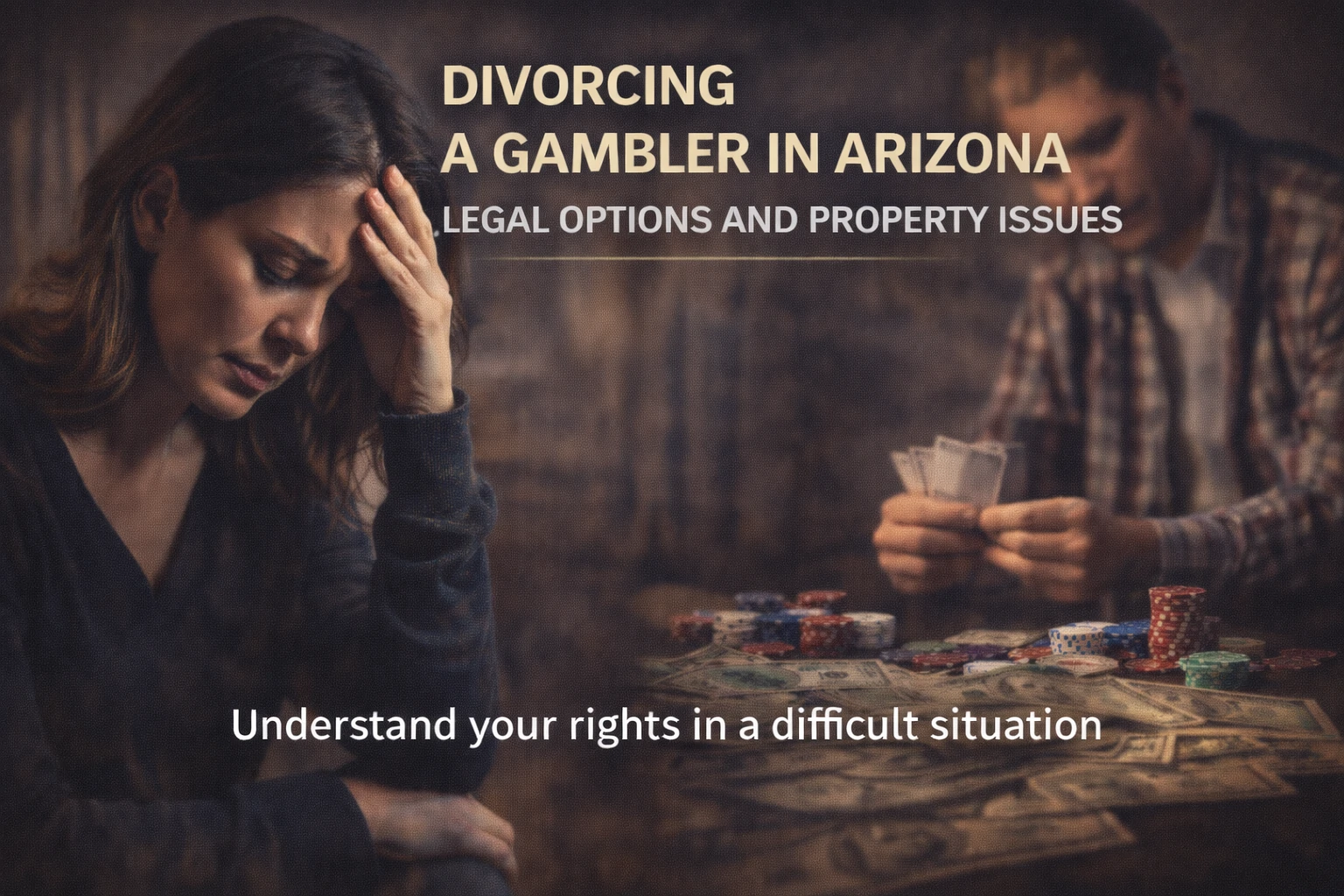Marriage builds on trust and shared goals. Love alone cannot fix damage caused by lies or lost money. A gambling spouse can break that trust fast. They may hide debt, take out loans, or drain joint savings. These actions bring stress and fear into the home.
Many people in Arizona live with this silent problem. They feel stuck, unsure of what comes next. Some stay quiet to avoid shame. Others try to fix things alone. But silence solves nothing. You need answers. You need clear steps.
Divorce with a gambler involves more than ending a relationship. The court must divide money, protect children, and deal with hidden debt. Arizona law has clear rules that can help. You may worry about your savings. You may ask if gambling affects custody. This guide will help you understand how the law works in real life.
Each part of this article gives you facts. It explains how courts see gambling. It shows how to protect your share of property, request support, and keep your children safe. You have options. This guide helps you take the first smart step toward peace.
Gambling and Divorce: The Arizona View
Arizona is a no-fault divorce state. That means the court does not need a reason to grant a divorce. You do not have to prove your spouse caused harm. But some facts, like gambling, still matter in certain parts of the case.
The court will not punish someone just for gambling. But if gambling caused a loss of community money, the court may adjust the final property division. This is called “waste” of community assets. A judge can give more to the other spouse to make up for the loss.
If the gambler used joint funds without consent, the court may consider that during the division. But you must show proof. Bank statements, credit card records, or even casino receipts can help your case. The court wants clear signs of how money was used.
Judges understand gambling addiction. Arizona courts often view it as a form of misconduct if it causes harm. That doesn’t affect the right to divorce, but it may affect how assets and debts get split.
Property Division in a Gambling-Related Divorce
Arizona uses community property law. That means both spouses share what they earned or bought during the marriage. In most cases, the court tries to split this 50/50. But gambling can change this balance.
If one spouse used shared money to gamble, that amount may be seen as wasted. The court may give the non-gambling spouse a larger share to make things fair. This is not automatic. You must show the gambling was reckless or hidden.
Any debt from gambling may also be reviewed. If your spouse took out loans or used credit cards without your agreement, the court may assign those debts only to them. This protects you from paying for losses you never agreed to.
Keep in mind, not all gambling counts as waste. A few small bets may not affect the case. But large withdrawals, secret trips to casinos, or online gambling that drained accounts could lead to a different outcome.
Spousal Maintenance and Gambling
Spousal maintenance, also called alimony, helps one spouse after divorce. Arizona courts look at need, ability to pay, and the standard of living during the marriage. Gambling can affect this if it caused harm to the household.
If a gambling spouse seeks support, the court may ask tough questions. Did their choices cause the breakup? Did they hurt the couple’s finances? A judge may lower or deny support if the gambler caused major financial damage.
On the other hand, if you are the non-gambling spouse and now face debt or lower income because of the divorce, you may ask for support. The court may award payments to help you recover.
Each case is unique. Judges want to see honest financial records. Be ready to explain how gambling affected your home, money, and plans for the future.
Child Custody and the Impact of Gambling
Arizona courts care most about the child’s best interest. The law puts safety, stability, and a calm home first. A parent’s gambling can raise concerns if it harms the child in any way.
If your spouse left the child alone, skipped visits, or created an unsafe home, the court will take notice. Judges also act when gambling links to alcohol, drugs, or angry outbursts. These signs may lead to supervised visits or reduced time with the child.
But the court does not assume all gamblers are bad parents. You must show a link between gambling and unsafe parenting. Talk to a lawyer about how to collect that proof.
Arizona courts often encourage shared custody when both parents are safe and stable. A gambling problem alone may not stop that. But if a child’s safety is at risk, the court will take strong steps to protect them.
Steps to Protect Yourself in a Divorce from a Gambler
Many people fear they will lose everything. But Arizona law gives ways to protect your share of property and your future. Act early and smart.
First, gather all financial records. Look for joint accounts, credit cards, loans, or unusual spending. Keep copies in a safe place. If you see signs of hidden accounts or secret debts, tell your lawyer at once.
Next, get legal advice. A family law attorney in Arizona will know how to guide your case. They can help you freeze accounts, stop new debts, and track down assets.
If needed, file for temporary orders. These court orders can give you control over money, property, or even the home during the divorce. That gives you time and space to work things out without more damage.
Some people also ask the court to send the gambler for a mental health or addiction exam. This helps the court understand the full picture. It may also help in custody or spousal support matters.
Finally, take care of your emotional health. Gambling breaks trust. Divorce adds stress. Find support through friends, family, or therapy. You are not alone, and help exists.
Conclusion
Ending a marriage with a gambler is not easy. It brings stress, fear, and many hard choices. But it also brings a chance to rebuild. Arizona law takes these cases seriously. The court works to protect your home, your children, and your future.
You have the power to act. Know your rights. Keep clear records. Choose a lawyer who knows how gambling affects divorce. Each step you take now can bring peace later.
Gambling may cause pain, but it does not control what comes next. Your choices shape your future. Arizona law gives you tools to stand up, move forward, and start again with strength.
Gambling may cause pain, like other hidden risks in everyday products such as those seen in the Lola tampons lawsuit, but it does not control what comes next.
Frequently Asked Questions (FAQs)
What happens to joint debt if my spouse gambled with credit cards?
Q. The court will look at who created the debt and how it was used. If your spouse made secret charges or used cards for gambling without your consent, the judge may assign that debt to them alone.
Can I get more of the property if my spouse wasted money on gambling?
Will gambling affect who gets the kids?
Q. Gambling may affect custody only if it harms the child’s safety or home life. The court wants to see if the gambler can provide a stable and safe place for the child.
Can I stop my spouse from gambling during the divorce?
Q. You can ask the court for temporary financial orders. These can limit access to joint accounts or stop your spouse from making new debts during the case.
Is gambling enough to deny spousal support?
Q. The court may lower or deny support if the gambler’s actions caused major financial harm. Each case depends on income, need, and impact on the marriage.
Disclaimer:
This article gives general legal information based on Arizona law. It does not give legal advice. Every case is different. Speak to a licensed Arizona attorney to get advice for your situation.




